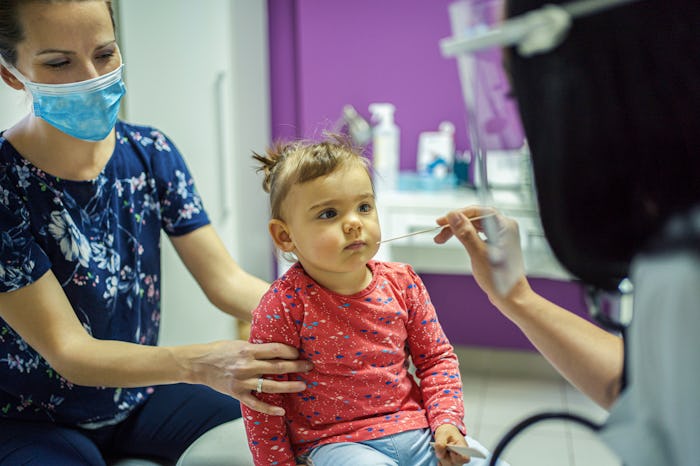Life

How To Prepare Your Toddler For The Coronavirus Test, According To Experts
Your toddler wakes up with a runny nose for the third day in a row and this time there's a low-grade fever to go with it. You know it's time to call the pediatrician, which will mean a trip to the office and, likely, a coronavirus test just to be safe. Don't get too stressed, though, because knowing how to prepare your toddler for COVID testing will help to make the visit a little easier for everyone involved.
First, in order to prepare your toddler for the experience, you need understand what to expect. To test for the coronavirus, a doctor or a nurse needs to collect a specimen sample from your child. There are a few ways to do this, Tom Belhorn, M.D., Ph.D., Director of Pediatric Infectious Diseases at the University of North Carolina, tells Romper in an email. These choices are a saliva collection, oropharyngeal (throat) swab, or nasopharyngeal (nasal) swab — but because saliva tests aren't considered to be as accurate as the others, your child is most likely to experience a nasal swab or throat swab, or possibly both. "If the child has had the symptoms for a longer period of time," says Dr. Belhorn, "some providers may do both the [nasal] swab and [throat] swab."
The process sounds intimidating, but there's a good chance your child has already had the nasal swab in the past because physicians use the same collection process for COVID-19 as they do for influenza, pediatrician Whitney Casares M.D. tells Romper. Also, if you or your child have ever been tested for strep throat, the throat swab collection process is the same.
When it's time to go to the doctor, if you know or suspect your toddler will be tested for COVID, bring "a comfort item, a stuffed animal or blanket, to hold during the test," says Dr. Belhorn. Another thing he suggests to keep your child at ease is music (especially if it's a drive-through clinic). "Music is often a great means to soothe children —before, during and after a procedure." You might also want to use this time to talk to them about how their doctor and nurse will be dressed (gown, gloves, mask, face shield, etc.).
Once you're there and the test is inevitable, you can tell them about what's going to happen, but Dr. Casares says not to "over-explain what testing will be like" and to "give short, simple answers to your toddler's questions when they arise."
When the swab comes out and it's go-time, both Dr. Casares and Dr. Belhorn stress the importance of staying calm. "When a parent is calm, a child is more likely to be calm," says Dr. Casares. Beyond that, you'll want to keep them comfortable and sitting still. Depending on age, "some parents can encourage [their] child to stay still with phrases such as 'pretend to be as still as a statue' or 'still as a soldier' or 'stay frozen like Elsa'," says Dr. Belhorn. If you're in the office, he recommends having your toddler sit on your lap while you hug them, forward-facing; if you're doing a drive-through test, hold their hand while they stay in their car seat.
After the samples have been taken, give your tot a big hug or squeeze and shower them with praise. Even if they didn't handle the procedure well, they did their best (and if a sample was collected, that's the only thing that really matters). Reward them with something they'll love like a sticker, little toy, a treat, or even a few extra minutes of screen time. And make sure you also give yourself a pat on the back, because keeping a toddler calm in these situations is a big ask. (Feel free to treat yourself to a little reward, too.)
If you think you’re showing symptoms of coronavirus, which include fever, shortness of breath, and cough, call your doctor before going to get tested. If you’re anxious about the virus’s spread in your community, visit the CDC for up-to-date information and resources, or seek out mental health support. You can find all of Romper’s parents + coronavirus coverage here.
Experts:
Tom Belhorn, M.D., Ph.D., Director of Pediatric Infectious Diseases at the University of North Carolina
Whitney Casares, M.D., M.P.H., author of The New Baby Blueprint: Caring for You and Your Little One and founder of www.modernmommydoc.com
This article was originally published on